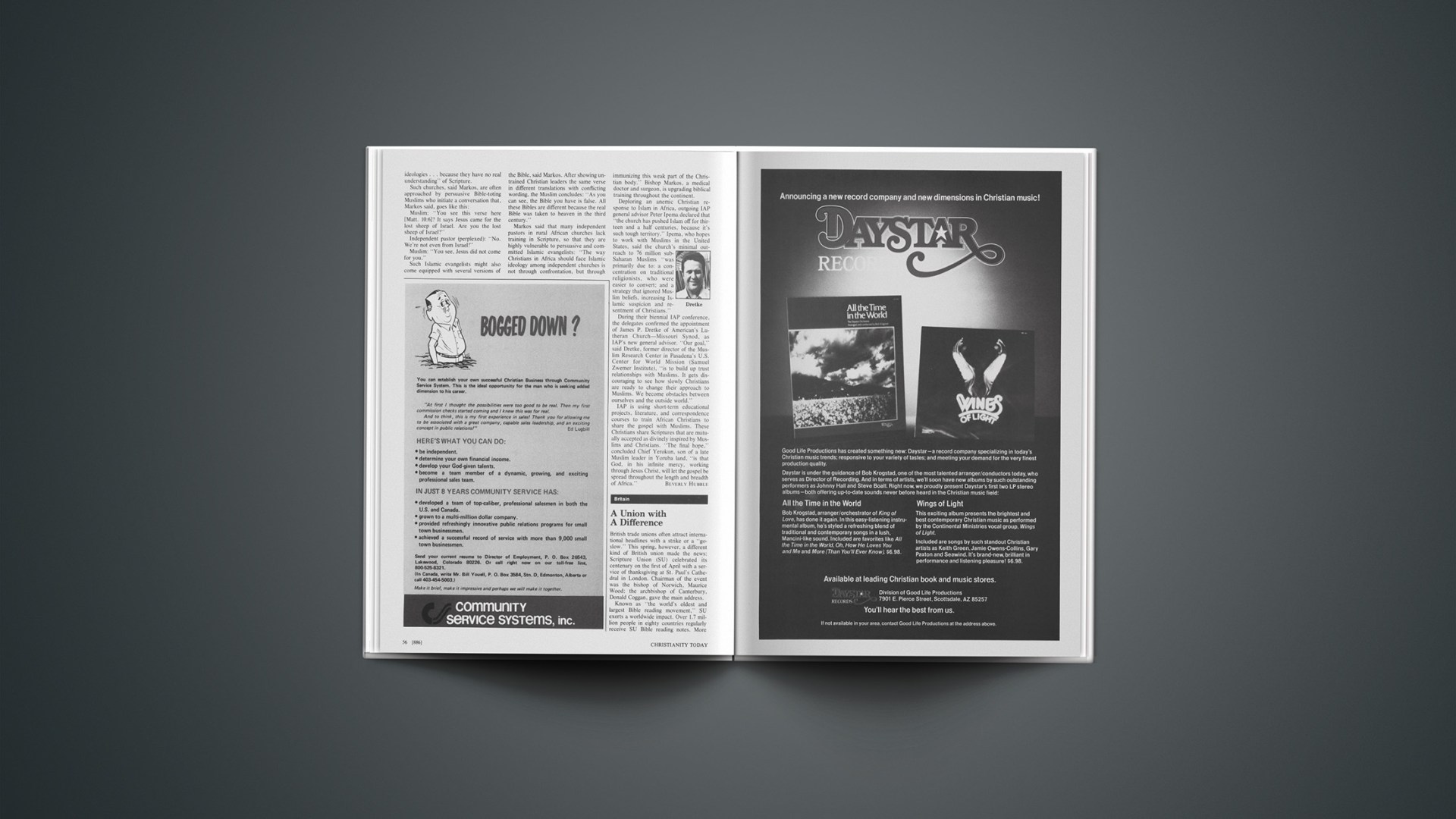British trade unions often attract international headlines with a strike or a “go-slow.” This spring, however, a different kind of British union made the news: Scripture Union (SU) celebrated its centenary on the first of April with a service of thanksgiving at St. Paul’s Cathedral in London. Chairman of the event was the bishop of Norwich, Maurice Wood; the archbishop of Canterbury, Donald Coggan, gave the main address.
Known as “the world’s oldest and largest Bible reading movement,” SU exerts a worldwide impact. Over 1.7 million people in eighty countries regularly receive SU Bible reading notes. More than one-third of all SU staff members live and work in Africa. On the South Pacific island of Tonga there is a branch in every town and village.
Connected with the centenary celebrations is an appeal for $300,000. The money would put more SU staff members into the field and give special assistance to inner-city ministries throughout Britain. Furthermore, additional Bible reading notes would be translated for Indian children and Arabic-speaking adults. (Before the actual anniversary day, more than half of the needed funds had been given or pledged.)
A further centennial event was a reception at the House of Commons. A Christian member of Parliament, Michael Alison, served as host, and leaders in education and community services were invited. The Lord Mayor of London, Sir Kenneth Cork, sponsored a reception at the Mansion House, ceremonial center for the city, and he told the SU representatives, “I have the Bible on cassette beside my bed” for easy access.
Such prominence and respectability is the legacy of a century—but was obviously not the case when SU was formed on “All Fools’ Day” 1879. A teen-age Sunday school teacher from Keswick in the Lake District hatched the idea that led to SU’s formation. Annie Marston devised a successful plan to encourage daily Bible reading among her pupils, and wanting to have her plan published, she approached T. B. Bishop, the noted layman who led the Children’s Special Service Mission. Bishop embraced the plan and the cause, and on April 1, 1879, a little card began circulating that bore a schedule of Bible readings. Almost immediately the cards were placed into the hands of 6,000 children; that number burgeoned to 30,000 within a few months.
Because of its simplicity and usefulness, the Scripture reading plan soon spread overseas. Explanatory notes were added in 1886 at the suggestion of a Cambridge medical student, Charles Harford-Battersby. In that year a periodical containing aids to understanding the Bible appeared under the quaint Victorian title Our Boys Magazine. British troops in the trenches of World War I were supplied with special notes. It was 1920, however, before the notes were released to the general public.
The backbone of the SU program is still Bible reading notes, which are written by pastors and laymen throughout the British Isles. One young reader recently complimented those writers: “The people who write Daily Bread seem to understand the doubts and niggles that every young Christian has at the back of his mind.” And unlike many devotional materials, SU notes get people into Scripture; one can’t use them without an open Bible.
Today SU is more than a Bible reading association. It provides a full range of Sunday school materials that are used throughout the United Kingdom. These are supplemented by a line of filmstrips, cartoons and cassettes, which often feature noted British entertainers such as Cliff Richard and Roy Castle.
Since 1960 new emphasis has been placed on direct evangelism, and on Bible teaching and training for children’s and youth work. SU binds together a network of 2,000 Christian Unions (Bible clubs) in schools throughout the British Isles; training and materials are supplied to leaders of these groups. The Frontier Youth Trust targets youth work in inner-city areas, and special training and pastoral support is supplied to persons working in these concrete jungles. SU also has a growing chain of bookshops in the British Isles.
SU is often recognized by its symbol, a small badge depicting an ancient lamp. When he was a newscaster on national television, Ronald Allison often wore the badge and by doing so gave impetus to Christian witness. Later Allison became press secretary to the Queen.
Commenting on the SU centenary was general director Alan Martin: “We are convinced that the centenary year can be a launching pad for a significant advance in sharing the Word of God.” As a Manchester Guardian article underlined recently, there is a tremendous revival of interest in Christian faith. SU will use this interest to spur Scripture reading in its second century.
Scripture Union in North America
Introduced to Canada as early as 1890 and calling its first Canadian secretary in 1915, Scripture Union (SU) had nearly lapsed by the end of World War II. Stacey Woods infused new life into the movement in the late 1940s, however, and today, under William Tyler, it boasts about 25,000 subscribers for the Bible reading notes, with Quest Clubs (for juniors), Key Clubs (for junior highs), and Holiday Clubs (summer beach evangelism).
SU spilled over from Canada into the United States in 1959, through Woods’s efforts, beginning with 5,000 U.S. subscribers. SU had trouble establishing its identity during its first decade in the States. Its long-established Daily Bread was confused with Richard DeHaan’s Radio Bible Class Our Daily Bread. Clifford Swanson, director since 1972, has stimulated growth by changing notes titles—from Daily Bread to Discovery and from Daily Notes to Encounter With God—pushing church-wide distribution, and adding a Bible study materials line for campers. Subscriptions have climbed to about 40,000, and 28,000 camper packs were used last summer.










